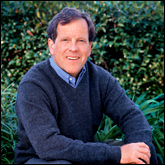
Last Friday, long-time Sierra Club executive director Carl Pope announced that he is stepping down and moving to a new role as chairman of the group.
The move comes after 17 years at the helm, and just days after a more environment-minded president took office, prompting some to wonder what Pope has up his sleeve. In his new role, he’ll be focusing primarily on climate change work, so we dropped him a line to get more details.
Grist: What prompted the change in position now, right after a new president was sworn in who seems likely to be much more sympathetic to green issues?
Carl Pope: The new administration and Congress offer so many opportunities to move our agenda that I wanted to focus more energy on the outside role, and less on management.
Grist: How will your role at the organization change? What will be the relationship between you and the new executive director?
Pope: After the transition, I’ll be doing strategy, political, and fund-raising work — and the new ED will be leading the organization and managing the staff. We’ll both report to the board.
Grist: In the new role, you’re going to be focusing primarily on climate policy. What are your plans in that area? What do you hope that the new focus will allow you to do?
Pope: We’ve launched an ambitious Climate Recovery Partnership, with three key goals: cut greenhouse pollution to the level scientists tell us the atmosphere can handle, leverage natural ecosystems to help protect landscapes and human communities during the coming period of unstable climate, and then eventually restore the climate by allowing enhanced forests, soils, grasslands, and oceans to gradually sequester the excess CO2 emitted over the last century. It’s the most ambitious, broad-scale program I know of — and I want to help make very bit of it hum.
Grist: What do you think of the recent polls showing that Americans are confused and unconcerned about climate change — that the number of people worried about global warming is actually dropping?
Pope: Americans don’t understand these issues in silos — they think we have one big problem, dependence on backward, fossil-fuel energy technologies, and that global warming, the trade imbalance, environmental pollution, our involvement in the Middle East, and the collapse of American manufacturing are all symptoms of this one big problem. But pollsters keep asking people about the symptoms. When they ask about the problems, support for a new, clean, low-carbon energy economy is off the charts.
Grist: Do you think the Sierra Club should be focusing more on climate change and less on land conservation and other issues?
Pope: Again, these silos don’t work — climate change is destroying the lands we have conserved, but restoring landscapes can help solve climate change. They’re one dynamic system which has been managed for collapse, and now needs to be managed for restoration.
Grist: What do you think are the chances for getting a climate bill passed this year? What do you think of the U.S. Climate Action Partnership (USCAP) plan released recently that some of the other big green groups have endorsed?
Pope: Passing a climate bill this year is important, but it will be a big lift. We just have to keep moving the ball as fast as we can. The USCAP plan has good final goals, but its architecture and internal structure won’t get us where we need to go on time — we need a higher bar.
Grist: One of the biggest climate battles is, and will continue to be, around coal — countering the “clean coal” messaging, for one. And we’re seeing more mainstream outlets like the New York Times now coming out and saying that “clean coal” is a myth. How do you think the coal fight is going?
Pope: Remarkably well. The Energy Information Agency just admitted that two-thirds of the new coal plants proposed three years ago are not going to happen, and that as a result in 2030 their projections of U.S. CO2 emissions had to be reduced by 9 percent. But we still need to explain to people that for King Coal, the idea of sequestering the carbon dioxide — which is essential if coal is ever to be clean, along with responsible mining and clean combustion — is not a pot of gold at the end of a rainbow. Really, clean coal is the coal industry’s worst nightmare — because it would cost them money to clean up their mines and power plants, and they have no intention of doing so. That’s why the real research on carbon sequestration is not being funded by this very rich industry — instead, they’re funding ads that are eco-porn.
Grist: You’ve been the executive director at the Sierra Club for 17 years. What do you list as your favorite accomplishments in that role?
Pope: Holding off George Bush for eight years. When he got on that helicopter, the Clean Air Act, the Clean Water, the ESA [Endangered Species Act], and NEPA [National Environmental Policy Act] were intact — and he only managed to build seven miles of roads in wild forests. Dick Cheney didn’t earn his campaign contributions from his buddies — however hard he tried.

